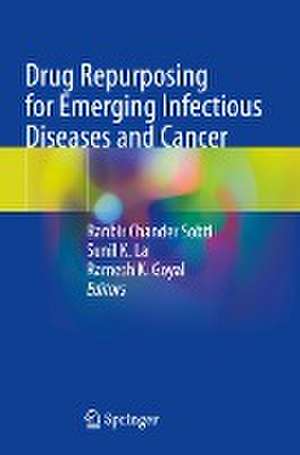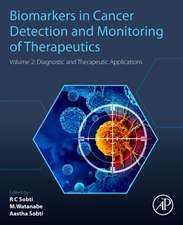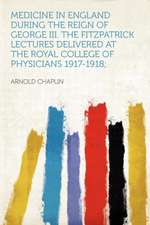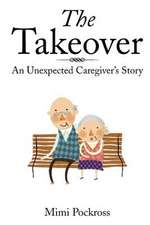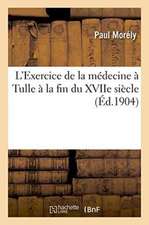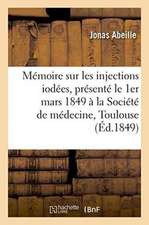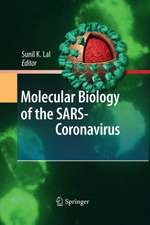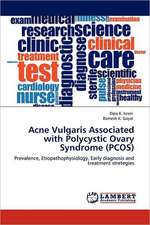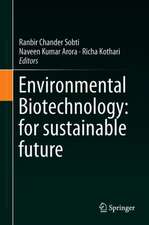Drug Repurposing for Emerging Infectious Diseases and Cancer
Editat de Ranbir Chander Sobti, Sunil K. Lal, Ramesh K. Goyalen Limba Engleză Paperback – 7 feb 2024
| Toate formatele și edițiile | Preț | Express |
|---|---|---|
| Paperback (1) | 1352.89 lei 38-45 zile | |
| Springer Nature Singapore – 7 feb 2024 | 1352.89 lei 38-45 zile | |
| Hardback (1) | 1443.13 lei 3-5 săpt. | |
| Springer Nature Singapore – 7 feb 2023 | 1443.13 lei 3-5 săpt. |
Preț: 1352.89 lei
Preț vechi: 1424.09 lei
-5% Nou
Puncte Express: 2029
Preț estimativ în valută:
258.87€ • 270.28$ • 214.25£
258.87€ • 270.28$ • 214.25£
Carte tipărită la comandă
Livrare economică 31 martie-07 aprilie
Preluare comenzi: 021 569.72.76
Specificații
ISBN-13: 9789811954016
ISBN-10: 9811954011
Pagini: 654
Ilustrații: XXI, 654 p. 1 illus.
Dimensiuni: 155 x 235 mm
Greutate: 1.19 kg
Ediția:1st ed. 2023
Editura: Springer Nature Singapore
Colecția Springer
Locul publicării:Singapore, Singapore
ISBN-10: 9811954011
Pagini: 654
Ilustrații: XXI, 654 p. 1 illus.
Dimensiuni: 155 x 235 mm
Greutate: 1.19 kg
Ediția:1st ed. 2023
Editura: Springer Nature Singapore
Colecția Springer
Locul publicării:Singapore, Singapore
Cuprins
Chapter 1_Repurposing of drugs: Introduction to technologies and application. - Chapter 2_The value added medicine: Pharmacovigilance re-evaluated. - Chapter 3_Polypharmacology and drug repurposing. -Chapter 4_Comparative transcriptome analysis for infectious diseases towards the identification of cellular pathways for drug repositioning. -Chapter 5_Repurposing of drugs for the treatment of microbial diseases. -Chapter 6_RNA-dependent RNA polymerase (RdRp) - a potential therapeutic approach for Coronavirus drug repositioning. -Chapter 7_Drug repurposing for emerging and re-emerging infectious diseases. -Chapter 8_Drug repurposing for the control of COVID-19.-Chapter 9_Repurposing of anti-inflammatory agents in the potential treatment of SARS 2CoV -2 infection. -Chapter 10_Repurposing of immune-modulators for the treatment of cancer with a QSAR approach. -Chapter 11_ Repurposing Cancer drugs towards antiviral targets in developing countries. -Chapter 12_Repurposed drugs for hematological malignancies. -Chapter 13_Reverse translational approach in repurposing of drugs for anticancer therapy. -Chapter 14_Repurposing of Minocycline: a tetracycline antibiotic for neurodegenerative disorders. -Chapter 15_Drug repurposing for Neglected diseases: Approaches, challenges and promising candidates.
Notă biografică
Dr Ranbir Chander Sobti, former Vice-Chancellor Panjab University, Chandigarh & Babasaheb Bhimrao Ambedkar University (Central University), Lucknow and former Education Advisor to the Governor of Bihar is a scientist, an able administrator and dynamic institution builder.
Starting his career as a Cytogeneticist, he moved on to molecular biology including genomics to understand the susceptibility and disease process of cancer, COPD, AIDS, metabolic syndrome and kidney diseases. He has also used Stem Cells and nanoparticles to follow the process of tissue organ development through designed decellularization protocol. Earlier he had worked on the cytogenetics and molecular genetics of various animal groups including humans as well as molecular toxicology of agricultural pollutants using in vitro and in vivo protocols.
He has published more than 350 papers in the journals of national and repute such as Mutation Research, Carcinogenesis. Archives of Toxicology, Cancer Genetics and Cytogenetics, Molecular Cell Biochemistry, PLOS I to name a few. more than 50 books by international publishers such as Springers, Academic Press, CRC, Elsevier, and others.
He is a Fellow of the Third World Academy of Sciences, National Academy of Sciences India, Indian National Science Academy, National Academy of Medical Sciences, National Academy of Agricultural Sciences Canadian Academy of Cardiovascular Diseases and few others. He was the General President of Indian Science Congress Association for the 102nd session held at University of Jammu in 2013. He is the recipient of many prestigious awards like, the INSA Young Scientist Medal, UGC Career Award, Punjab Rattan Award, JC Bose Oration and Sriram Oration Awards and of Life Time Achievement Awards of the Punjab Academy of Sciences, Zoological Society of India, and the Environment Academy of India, besides many other medals and awards of national and International levels. He was awarded Padmashri ,the third highest civilian award by the Government of India in 2009 for his contributions to the cause of Education. He has chaired /delivered lectures at the national and international conferences/symposia/workshops.
Dr. Sobti, an active researcher, is also steadfastly committed to the popularization of science in the community through popular lectures and community engagement programs.
Dr Sunil Lal is a PhD from the Georgia Institute of Technology, Atlanta, USA in Microbial Genetics (1989) following which he joined the faculty at California Institute of Technology, Pasadena (1994). Following this, Prof. Lal joined the ICGEB (International Center for Genetic Engineering and Biotechnology) of the United Nations at New Delhi, India where he served as an International Research Scientist for 21 years. In 2014 Prof Lal joined the School of Science, Monash University, Malaysia where he is currently a Professor of Microbiology and leads an active research group on Systems Virology. Prof. Sunil is internationally well known for his research work in the field of RNA viruses including SARS Coronaviruses, Influenza A virus and Hepatitis E virus. He has been a visiting scientist to Universiti Malaysia Sarawak, National University of Singapore, Karolinska Institute and the Centers for Disease Control (CDC) Atlanta. Prof. Sunil has won many prestigious international awards including the Hind Rattan (highest civilian honor from Govt. of India), and has been the regional representative for the American Society for Microbiology for 9 years besides being an Elected Fellow of the National Academy of Sciences (India). Prof. Sunil is on the editorial board of International Journals and is actively involved in peer-reviewing for some of the top-tier scientific journals. Prof. Sunil has over 200 publications in top international scientific journals and has published four international books on emerging viral diseases.
Professor Ramesh K. Goyal, is the Vice Chancellor of, Delhi Pharmaceutical Sciences and Research University, New Delhi. He was earlier the Vice-Chancellor of the Maharaja Sayajirao University of Baroda, Executive Director (Research & strategies) at V ClinBio Labs., Sri Ramachandra Medical Center University, Chennai, Director (Pharmacology and Clinical Research) at NMIMS University, Mumbai; Director ISF College of Pharmacy, Moga, Punjab and Professor at L. M. College of Pharmacy, Ahmedabad. He has been the Visiting Scientist and Visiting professor at the University of British Columbia, Vancouver, BC and Institute of Cardiovascular Sciences, Winnipeg, Canada. In 2019 he was conferred with the Honorary Professorship at Stavropol State Medical University, Russia and recently appointed as the Distinguished Professor at USCI University, Kula Lumpur, Malaysia. His research interest is development of newer drugs for cardiovascular and metabolic disorders through phyto-pharmaceuticals. Recently he has come up with an herbal formulation specifically targeting ACE-2 of SARC-CoV-2 virus. Dr Goyal got three patents awarded, 6 under consideration, 42 books and book chapters, over 350 full papers articles published in National and International journals. He is the recipient of 74 National & International Awards. He is the Fellow of eight professional bodies (FIPS, FIACS, FAMS, FIC, FICN, FNASc. FSCH, FIVSPT). He has been chairman/member of prestigious national and international bodies.
Starting his career as a Cytogeneticist, he moved on to molecular biology including genomics to understand the susceptibility and disease process of cancer, COPD, AIDS, metabolic syndrome and kidney diseases. He has also used Stem Cells and nanoparticles to follow the process of tissue organ development through designed decellularization protocol. Earlier he had worked on the cytogenetics and molecular genetics of various animal groups including humans as well as molecular toxicology of agricultural pollutants using in vitro and in vivo protocols.
He has published more than 350 papers in the journals of national and repute such as Mutation Research, Carcinogenesis. Archives of Toxicology, Cancer Genetics and Cytogenetics, Molecular Cell Biochemistry, PLOS I to name a few. more than 50 books by international publishers such as Springers, Academic Press, CRC, Elsevier, and others.
He is a Fellow of the Third World Academy of Sciences, National Academy of Sciences India, Indian National Science Academy, National Academy of Medical Sciences, National Academy of Agricultural Sciences Canadian Academy of Cardiovascular Diseases and few others. He was the General President of Indian Science Congress Association for the 102nd session held at University of Jammu in 2013. He is the recipient of many prestigious awards like, the INSA Young Scientist Medal, UGC Career Award, Punjab Rattan Award, JC Bose Oration and Sriram Oration Awards and of Life Time Achievement Awards of the Punjab Academy of Sciences, Zoological Society of India, and the Environment Academy of India, besides many other medals and awards of national and International levels. He was awarded Padmashri ,the third highest civilian award by the Government of India in 2009 for his contributions to the cause of Education. He has chaired /delivered lectures at the national and international conferences/symposia/workshops.
Dr. Sobti, an active researcher, is also steadfastly committed to the popularization of science in the community through popular lectures and community engagement programs.
Dr Sunil Lal is a PhD from the Georgia Institute of Technology, Atlanta, USA in Microbial Genetics (1989) following which he joined the faculty at California Institute of Technology, Pasadena (1994). Following this, Prof. Lal joined the ICGEB (International Center for Genetic Engineering and Biotechnology) of the United Nations at New Delhi, India where he served as an International Research Scientist for 21 years. In 2014 Prof Lal joined the School of Science, Monash University, Malaysia where he is currently a Professor of Microbiology and leads an active research group on Systems Virology. Prof. Sunil is internationally well known for his research work in the field of RNA viruses including SARS Coronaviruses, Influenza A virus and Hepatitis E virus. He has been a visiting scientist to Universiti Malaysia Sarawak, National University of Singapore, Karolinska Institute and the Centers for Disease Control (CDC) Atlanta. Prof. Sunil has won many prestigious international awards including the Hind Rattan (highest civilian honor from Govt. of India), and has been the regional representative for the American Society for Microbiology for 9 years besides being an Elected Fellow of the National Academy of Sciences (India). Prof. Sunil is on the editorial board of International Journals and is actively involved in peer-reviewing for some of the top-tier scientific journals. Prof. Sunil has over 200 publications in top international scientific journals and has published four international books on emerging viral diseases.
Professor Ramesh K. Goyal, is the Vice Chancellor of, Delhi Pharmaceutical Sciences and Research University, New Delhi. He was earlier the Vice-Chancellor of the Maharaja Sayajirao University of Baroda, Executive Director (Research & strategies) at V ClinBio Labs., Sri Ramachandra Medical Center University, Chennai, Director (Pharmacology and Clinical Research) at NMIMS University, Mumbai; Director ISF College of Pharmacy, Moga, Punjab and Professor at L. M. College of Pharmacy, Ahmedabad. He has been the Visiting Scientist and Visiting professor at the University of British Columbia, Vancouver, BC and Institute of Cardiovascular Sciences, Winnipeg, Canada. In 2019 he was conferred with the Honorary Professorship at Stavropol State Medical University, Russia and recently appointed as the Distinguished Professor at USCI University, Kula Lumpur, Malaysia. His research interest is development of newer drugs for cardiovascular and metabolic disorders through phyto-pharmaceuticals. Recently he has come up with an herbal formulation specifically targeting ACE-2 of SARC-CoV-2 virus. Dr Goyal got three patents awarded, 6 under consideration, 42 books and book chapters, over 350 full papers articles published in National and International journals. He is the recipient of 74 National & International Awards. He is the Fellow of eight professional bodies (FIPS, FIACS, FAMS, FIC, FICN, FNASc. FSCH, FIVSPT). He has been chairman/member of prestigious national and international bodies.
Textul de pe ultima copertă
This book presents drug repurposing strategies to combat infectious diseases and cancer. It discusses key experimental and in silico approaches for modern drug repositioning, including signature matching, molecular docking, genome-wide associated studies, and network-based approaches aided by artificial intelligence. Further, the book presents various computational and experimental strategies for better understanding disease mechanisms and identify repurposed drug candidates for personalized pharmacotherapy. It also explores the databases for drug repositioning, summarizes the approaches taken for drug repositioning, and highlights and compares their characteristics and challenges. Towards the end, the book discusses challenges and limitations encountered in computational drug repositioning.
Caracteristici
Highlight different drug repositioning strategies against infectious disease and cancer
Summarizes computational approaches that are used in drug repositioning studies
Presents experimental models to validate computational methods
Summarizes computational approaches that are used in drug repositioning studies
Presents experimental models to validate computational methods
